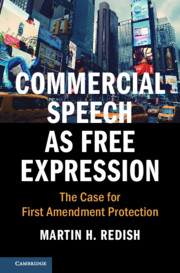Book contents
- Commercial Speech as Free Expression
- Cambridge Studies on Civil Rights and Civil Liberties
- Commercial Speech as Free Expression
- Copyright page
- Dedication
- Contents
- Preface
- Acknowledgments
- 1 Commercial Speech and the Values of Free Expression
- 2 False Commercial Speech and the First Amendment
- 3 The Right of Publicity, Commercial Speech, and the Equivalency Principle
- 4 Compelled Commercial Speech and the First Amendment
- 5 Scientific Expression and Commercial Speech
- Conclusion
- Index
2 - False Commercial Speech and the First Amendment
Published online by Cambridge University Press: 21 May 2021
- Commercial Speech as Free Expression
- Cambridge Studies on Civil Rights and Civil Liberties
- Commercial Speech as Free Expression
- Copyright page
- Dedication
- Contents
- Preface
- Acknowledgments
- 1 Commercial Speech and the Values of Free Expression
- 2 False Commercial Speech and the First Amendment
- 3 The Right of Publicity, Commercial Speech, and the Equivalency Principle
- 4 Compelled Commercial Speech and the First Amendment
- 5 Scientific Expression and Commercial Speech
- Conclusion
- Index
Summary
The statutory or common law right of publicity recognizes a right in individuals to control the use of their name or likeness for commercial purposes. The right enables an individual to sue to punish or prevent such commercial uses. However, with the First Amendment in the background, both state legislatures and courts recognized a sub-constitutional “newsworthiness” exception. This exception permits the traditional press to use photos or names, even though used for the purpose of making profit, when they are deemed newsworthy.As a result, the traditional institutions of the press are largely exempted from this cause of action while purely commercial uses of names or likenesses remain the target of the claim. Amazingly, at no point have courts enforcing the right of publicity given serious consideration to the implications for its constitutionality of the Supreme Court’s development of the commercial speech doctrine. This chapter argues that recognition of the commercial speech equivalency principle applies nowhere more forcefully than in this instance. A commercial advertisement will often provide information about individuals to the public that would fall under the newsworthiness exception for the traditional press.To the extent that commercial speech provides the exact same information to the exact same audience, it is not clear why statements by the traditional press receive quasi-First Amendment protection while purely commercial expression does not. Hence it is illogical not to provide the same protection to purely commercial speech. To the argument that commercial speech receives reduced protection because its goal is profit, the obvious response is that the profit-making press possess the very same commercial goal.
- Type
- Chapter
- Information
- Commercial Speech as Free ExpressionThe Case for First Amendment Protection, pp. 21 - 59Publisher: Cambridge University PressPrint publication year: 2021

